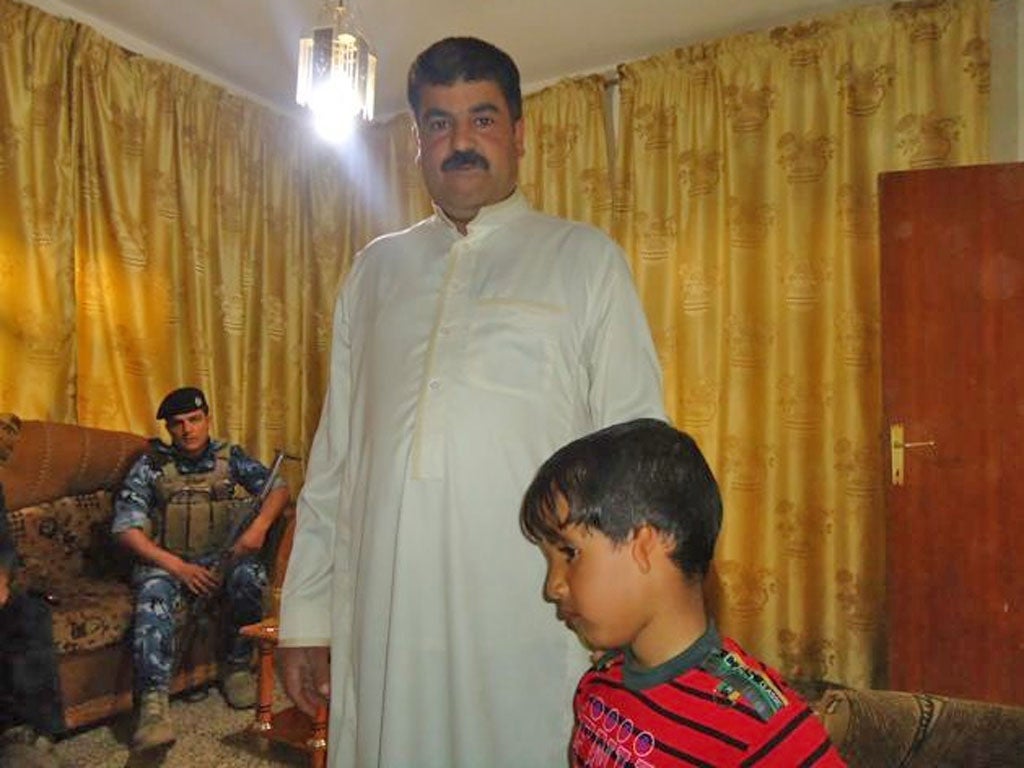A boy left with half his hearing and only one ear
A father blames America's use of chemical weapons for his son's abnormalities. By Robert Fisk in Fallujah

Your support helps us to tell the story
From reproductive rights to climate change to Big Tech, The Independent is on the ground when the story is developing. Whether it's investigating the financials of Elon Musk's pro-Trump PAC or producing our latest documentary, 'The A Word', which shines a light on the American women fighting for reproductive rights, we know how important it is to parse out the facts from the messaging.
At such a critical moment in US history, we need reporters on the ground. Your donation allows us to keep sending journalists to speak to both sides of the story.
The Independent is trusted by Americans across the entire political spectrum. And unlike many other quality news outlets, we choose not to lock Americans out of our reporting and analysis with paywalls. We believe quality journalism should be available to everyone, paid for by those who can afford it.
Your support makes all the difference.He needs multiple surgery outside Iraq. It's a dysfunctional problem. He has no hearing in his left ear. They told me he has to be six before they can remove cartilage from his chest wall to put in his ear. All operations have to be outside Iraq to beautify the ear and give him his hearing."
And all the while his father talks, five-year-old Sayef Ala'a sits on the sofa beside us, doing as his father tells him, moving his head to show us the scrappy bit of flesh that constitutes his left ear, tipping his head to one side so we can take pictures of it. Compared to other children with birth deformities, Sayef Ala'a is lucky. He can see, breathe, walk, run, play and listen to his father and friends with his right ear. And he is a little boy of much courage.
"He hasn't learned much yet – that's because he hasn't been to school," his father says. "I'm worried he would be bullied at school. He's a child, but sometimes he comes to me and says he knows he has a deformed ear; but it doesn't matter, he says, because he has no other problems. He is shy but he doesn't mind seeing you." And here the father points at us as we sit beside his son on the sofa. "But no other foreigners come to see him."
Like others in Fallujah, Sayef Ala'a's father, who is a businessman, hopes that NGO officials will turn up one day and offer the boy a foreign visa, medical treatment, education. It is a dream that will never be realised – not so long as even the Iraqi government takes no interest in the deformed children of Fallujah. Sayef Ala'a has a three-year-old brother who has no health problems – but then Sayef Ala'a was conceived in 2006, two years after the battles of Fallujah, his brother two years after that.
Sayef Ala'a's mother is his father's first cousin but the families had no history of congenital anomalies. "It's the result of chemical weapons used by the Americans in Fallujah," the father says. He has seen other, much worse abnormalities than that from which his son suffers. All the other families say the same thing.
"Yes, my son's case is a bit trivial compared to the rest. But he only has half his hearing. I have got myself and my son a passport" – and here he produces the documents for our inspection – "because some day a charity organisation will knock on my door and take him outside Iraq."
Yet when I ask him who is to blame, Sayef Ala'a's father says almost the same words as the father of 14-month-old Sayef Mohamed, who has an outsize head and is blind and paralysed. "I do believe in God, so I leave things to God – I don't believe any human being is going to help. I was concerned before we had our second child in case he had similar problems, but I left things to God because I wanted this second child."
The family have consulted two Baghdad professors – one of them with a diploma of medicine from Glasgow University – and they have a sense of perspective that others may lack in Fallujah. Sayef Ala'a's grandfather claims that the RAF dropped mustard gas on their distant relatives, in the town of Diyala, in 1917, during the First World War – and that there were deformities even then. Of course, it may be easy for a family – fearful of shaming their "honour" by admitting their child suffers birth anomalies – to blame the weapons of Fallujah's American enemies for their misfortunes.
But why did the US first deny using phosphorous in built-up areas of the city in 2004 – and admit the truth only when a video clearly showed phosphorous being fired? And why does no one from outside come to examine Sayef Ala'a's scratch of an ear?
Join our commenting forum
Join thought-provoking conversations, follow other Independent readers and see their replies
Comments